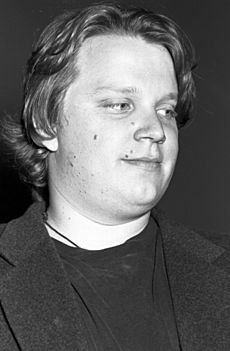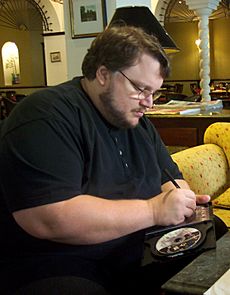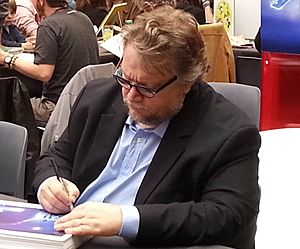Guillermo del Toro facts for kids
Quick facts for kids
Guillermo del Toro
|
|
|---|---|
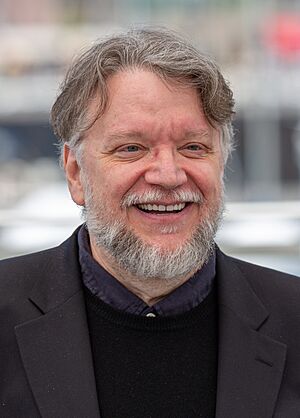
Del Toro in 2025
|
|
| Born |
Guillermo del Toro Gómez
9 October 1964 Guadalajara, Jalisco, Mexico
|
| Occupation |
|
| Years active | 1985–present |
| Spouse(s) |
Lorenza Newton
(m. 1986; div. 2017)Kim Morgan
(m. 2021) |
| Children | 2 |
| Signature | |
Guillermo del Toro Gómez (born October 9, 1964) is a famous Mexican filmmaker, author, and artist. He is known for his unique style that often mixes fairy tales, spooky stories, and horror. He tries to make even scary things look beautiful.
Guillermo del Toro loves monsters and sees them as symbols of great power. He is famous for creating dark fantasy films. His movies often feature images of insects, religious ideas, and show that being different is okay. He explores hidden worlds, uses real special effects, and often uses warm, amber colors in his films.
Throughout his career, del Toro has made movies in both Spanish and English. Some of his Spanish films include Cronos (1993), The Devil's Backbone (2001), and Pan's Labyrinth (2006). His English films include Mimic (1997), Blade II (2002), Hellboy (2004), Hellboy II: The Golden Army (2008), Pacific Rim (2013), Crimson Peak (2015), The Shape of Water (2017), Nightmare Alley (2021), and Pinocchio (2022).
He has also worked as a producer or writer on many other films. These include The Orphanage (2007), Don't Be Afraid of the Dark (2010), and The Hobbit film series (2012–2014). In 2022, he created the Netflix horror series Guillermo del Toro's Cabinet of Curiosities. This series features a collection of classic horror stories.
With Chuck Hogan, he wrote The Strain trilogy of novels (2009–2011). These books were later turned into a comic-book series and a TV show. He also created the animated series Tales of Arcadia with DreamWorks Animation and Netflix. This series includes Trollhunters (2016–18), 3Below (2018–19), and Wizards (2020). A movie called Trollhunters: Rise of the Titans (2021) followed.
Guillermo del Toro is good friends with other Mexican filmmakers, Alfonso Cuarón and Alejandro G. Iñárritu. They are often called "The Three Amigos of Mexican Cinema." He has won many awards, including three Academy Awards (Oscars). In 2018, Time magazine named him one of the 100 most influential people in the world. He received a star on the Hollywood Walk of Fame in 2019.
Contents
Early Life and First Films
Guillermo del Toro Gómez was born in Guadalajara, Mexico, on October 9, 1964. His parents were Guadalupe Gómez Camberos and Federico del Toro Torres. He grew up in a strict Catholic family. He later studied film at the University of Guadalajara.
When he was about eight years old, del Toro started making short films. He used his father's camera and toys. One of his early films was about a potato that wanted to take over the world. He made about 10 short films before his first big movie. Only two of these, Doña Lupe and Geometria, are available to watch. He also wrote and directed episodes for the TV series La Hora Marcada.
His first planned movie was a stop-motion science fiction film called Omnivore. He and his team worked on it for three years. But vandals broke into their studio and destroyed everything. This led del Toro to switch to making live-action films, starting with Cronos.
Del Toro also studied special effects and make-up. He spent 10 years as a special-effects make-up designer. He even started his own company called Necropia. He also helped start the Guadalajara International Film Festival. Later, he co-founded a production company called "Tequila Gang" with other filmmakers.
In 1997, when he was 33, Guillermo del Toro made the film Mimic. He was not happy with how the studio treated him during this movie.
Major Film Projects
Del Toro has directed many different types of films. Some are based on comic books, like Blade II and the Hellboy movies. He has also made historical fantasy and horror films. Two of his most famous films, The Devil's Backbone and Pan's Labyrinth, are set in Spain during the Spanish Civil War. These films are highly praised.
Del Toro believes that horror movies can have important messages. He says that some horror stories tell you to follow rules. But other horror stories, like fairy tales, can be about breaking rules and challenging authority.
He is very close with fellow Mexican directors Alfonso Cuarón and Alejandro González Iñárritu. They often help each other with their films. Cuarón was a producer for Pan's Labyrinth, and Iñárritu helped edit it. These three filmmakers are known as the "Three Amigos."
In 2008, Peter Jackson asked del Toro to direct The Hobbit movies. But del Toro left the project in 2010 because of delays. Even though he didn't direct them, he is credited as a co-writer for the Hobbit films.
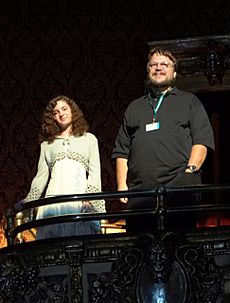
In 2009, del Toro's first novel, The Strain, was released. It was the first book in a vampire story series he wrote with Chuck Hogan. The next books were The Fall (2010) and The Night Eternal (2011).
Del Toro directed Pacific Rim, a science fiction film released in 2013. In this movie, giant monsters called kaiju attack cities. Humans fight back with huge robot suits called Jaegers. Del Toro said this was his biggest and most fun film to make. It earned over $411 million worldwide.
He also directed the first episode of The Strain TV series in 2014. This show was based on his novel trilogy.
After The Strain pilot, del Toro directed Crimson Peak (2015). This is a gothic horror film. He wanted it to feel like an old-fashioned ghost story, not like modern "found footage" horror films.
Recent Success and Future Plans
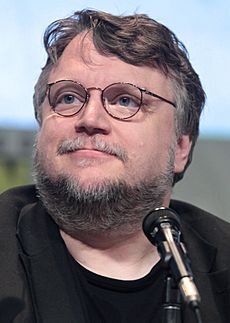
Del Toro directed The Shape of Water, a drama film set during the Cold War. It was released in 2017. The movie won the top award at the 74th Venice International Film Festival. It also won many other awards, including the Academy Award for Best Picture. Del Toro won the Academy Award for Best Director for this film.
From 2016 to 2018, his animated series Trollhunters was very popular on Netflix. It became one of Netflix's most-watched kids' original shows.
In 2017, del Toro had an art exhibition called Guillermo del Toro: At Home with Monsters. It showed his collection of paintings, drawings, and film art. The exhibition traveled to different cities.
In 2021, del Toro directed Nightmare Alley. This film received good reviews and was nominated for four Academy Awards.
In 2022, his stop-motion animated film Pinocchio was released on Netflix. This version of the classic story is set during the rise of Benito Mussolini. The film won the Academy Award for Best Animated Feature.
Guillermo del Toro has plans for more animated films. He has said he wants to focus mostly on animation in the future. He is working on a stop-motion film based on the novel The Buried Giant. He is also working on a Frankenstein film for Netflix, which began filming in January 2024.
Favorite Films and Interests
Guillermo del Toro loves movies and has shared his favorite films. In 2022, his top 10 favorite films included:
- 8½ (1963)
- Barry Lyndon (1975)
- Bride of Frankenstein (1935)
- City Lights (1931)
- Close Encounters of the Third Kind (1977)
- Goodfellas (1990)
- The Magnificent Ambersons (1942)
- Nazarín (1959)
- No Country for Old Men (2007)
- Shadow of a Doubt (1943)
He is also a big fan of video games, calling them "the comic books of our time." He enjoys games like Ico and Shadow of the Colossus.
His favorite film monsters are Frankenstein's monster, the Xenomorph, Gill-man, Godzilla, and the Thing. He has a special love for Frankenstein. He watches about three films every day.
Del Toro also enjoys Japanese manga and anime. He has called Doraemon "the greatest kids series ever created." He admires Hayao Miyazaki, who directed films like My Neighbor Totoro.
He is very interested in the Victorian era in England. He has a special room in his library filled with books by authors like Charles Dickens.
In 2019, del Toro helped Mexican students attend the International Mathematical Olympiad. He paid for their flights when government funding was stopped. He has also received an honorary doctorate from the National Autonomous University of Mexico (UNAM).
Personal Life
Guillermo del Toro married Lorenza Newton in 1986, and they had two daughters. They divorced in 2017. In 2021, he married Kim Morgan.
He has homes in Toronto and Los Angeles. He also visits his family in Guadalajara often. He owns two houses just for his huge collection of books, movie posters, and other items related to his work. He once said he dreamed of having a house with secret passages and a room where it rained all day.
Del Toro has described his political views as "a little too liberal." He often shows leaders who are too strict or controlling as villains in his films. He believes that institutions, whether social, religious, or economic, can be harmful.
He was raised Catholic but later became an atheist. He believes in humanity and its potential for both good and bad. He sees his art and storytelling as very important, almost like a spiritual practice. He also believes that monsters can represent the idea that it's okay to be imperfect.
Del Toro is very cautious about using AI in filmmaking. He thinks AI can make simple things like screensavers, but it cannot create art that makes people feel deep emotions. He believes that true art comes from human effort and risk.
Filmography
Film
| Year | Title | Distributor |
|---|---|---|
| 1992 | Cronos | October Films |
| 1997 | Mimic | Miramax Films |
| 2001 | The Devil's Backbone | Warner Bros. Pictures Sony Pictures Classics |
| 2002 | Blade II | New Line Cinema |
| 2004 | Hellboy | Sony Pictures Releasing |
| 2006 | Pan's Labyrinth | Warner Bros. Pictures |
| 2008 | Hellboy II: The Golden Army | Universal Pictures |
| 2013 | Pacific Rim | Warner Bros. Pictures |
| 2015 | Crimson Peak | Universal Pictures |
| 2017 | The Shape of Water | Fox Searchlight Pictures |
| 2021 | Nightmare Alley | Searchlight Pictures |
| 2022 | Pinocchio | Netflix |
| 2025 | Frankenstein |
Television
| Year | Title | Distributor |
|---|---|---|
| 2014–2017 | The Strain | 20th Century Fox Television |
| 2016–2018 | Trollhunters: Tales of Arcadia | Netflix NBCUniversal |
| 2018–2019 | 3Below: Tales of Arcadia | |
| 2020 | Wizards: Tales of Arcadia | |
| 2021 | Trollhunters: Rise of the Titans | Netflix |
| 2022 | Guillermo del Toro's Cabinet of Curiosities | Netflix |
Awards and Nominations
Guillermo del Toro's films have won and been nominated for many awards.
| Year | Title | Academy Awards | BAFTA Awards | Golden Globe Awards | |||
|---|---|---|---|---|---|---|---|
| Nominations | Wins | Nominations | Wins | Nominations | Wins | ||
| 2006 | Pan's Labyrinth | 6 | 3 | 8 | 3 | 1 | |
| 2008 | Hellboy II: The Golden Army | 1 | |||||
| 2013 | Pacific Rim | 1 | |||||
| 2017 | The Shape of Water | 13 | 4 | 12 | 3 | 7 | 2 |
| 2021 | Nightmare Alley | 4 | 3 | ||||
| 2022 | Guillermo del Toro's Pinocchio | 1 | 1 | 3 | 1 | 3 | 1 |
| Total | 25 | 8 | 27 | 7 | 11 | 3 | |
See also
 In Spanish: Guillermo del Toro para niños
In Spanish: Guillermo del Toro para niños
- Cinema of Mexico
- Guillermo del Toro's unrealized projects


